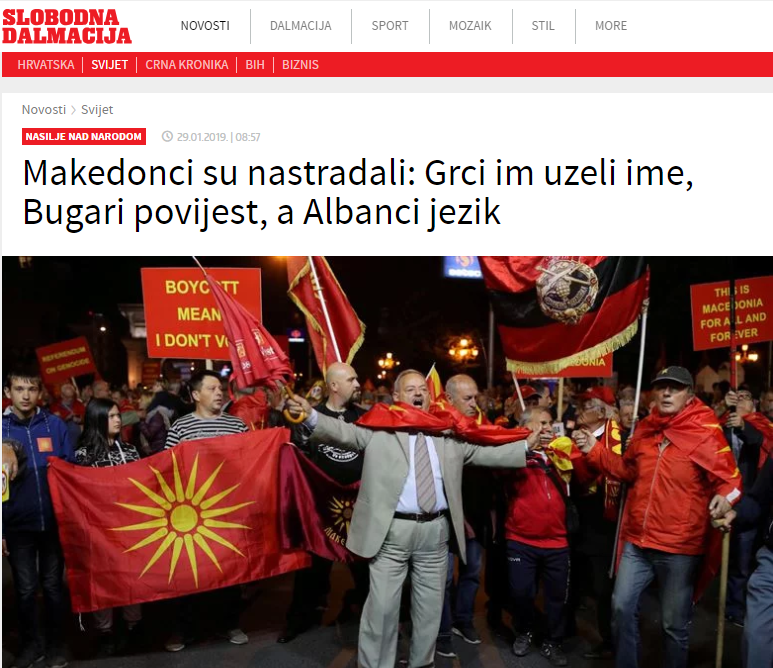Croatian commentator Ivan Brodic says that the forced name change of Macedonia amounts to “violence over an entire people”. Brodic blames outside interference in Macedonian politics for the tense situation the country is in and the imposition of the Prespa Agreement, despite the fact it was rejected by the voters at the referendum.
The self-declared post-national left took over power through confrontation and conflict, destroying property during the Colored Revolution, and now uses the same confrontation to remain in power. It’s interesting to see how lightly some on West push an entire nation in a conflict and are toying with their lives. The silent majority of Macedonians care about their national identity, about how they define themselves. It is a red line in history which no other nation has crossed, if it was determined to survive, Brodic told the Slobodna Dalmacija daily.
On top of the concessions Macedonia was forced to make toward Greece, Brodic outlines other concessions, toward other neighbors, such as the singing of the Albanian national anthem as the new Speaker was elected without the necessary 61 votes in Parliament. His article is titled – Macedonians lost everything, Greeks took their name, Bulgarians – their history, and Albanians – the language.
One political agreement introduced bilingualism throughout Macedonia, even in areas which have no ethnic Albanians, and where it was not needed. Another, the Sofia agreement, has Macedonians giving up on their history up until 1945 in favor of the Bulgarian history. And Zoran Zaev notably apologized to Bulgaria for referring to the Ilinden Uprising as an Macedonian Uprising. The Sofia Agreement is unnatural because it is known that Bulgarian literacy and the Bulgarian church come from Ohrid, from the Ohrid Archbishopric and the Ohrid literary school, a university of 3.000 students which predates the Sorbonne by a 100 years. Both Bulgaria and Greece now have the right to oversee school programs in Macedonia, so the worst element of the agreements is not the name change, but the abolition of the nationality and schoolbooks will stop using Macedonian names for geographic places in Pirin and Aegean Macedonia. It’s like forbidding Croats to use the word Bec for the city of Vienna, comments Brodic.
Asked about his opinion on the Macedonian opposition, which rejected the Prespa Agreement but was unable to prevent its adoption in Parliament, Brodic says that “it believes it will be possible to re-take power and/or use the process of European integrations and judicial actions to nullify the most dubious portions of the Prespa Agreement – the constitutional amendments which were forced on the country with violence, blackmail and political bargainings. I’m not an optimist, given the level of violence involved, but I wish them luck”, adds Brodic.
In the extensive interview, Brodic reminds the readers that support for joining NATO used to be 80 percent among Macedonians. Now, barely 36 percent got out to vote in a referendum on the name change and NATO and EU membership, and turnout was especially low among ethnic Macedonians.
Macedonia deserved to join these integration processes 20 years ago. Now they are resigned by the 20 years long blockade, but also by being powerless to stop this post-national, stateless behavior they witnessed. The drop of support for the integration is causing institutional problems in Macedonia. Except for a minority which suffers from Stockholm syndrome, Macedonians are overall embittered by the situation and the referendum boycott showed that. And if a good presidential candidate doesn’t step forward, I fear that the census will not be reached during the presidential elections either, Brodic said.
Almost as a side point, Brodic says, Macedonia also suffers from an economic decline, arrests of foreign investors, new levels of debt which previously took ten years to pile on and the stopping of major infrastructure projects.






Comments are closed for this post.